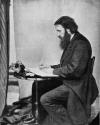Winter froze both brook and well;
Fast and fast the snowflakes fell;
Children gathered round the hearth
Made a summer of their mirth;
When a boy, so lately come
That his life was yet one sum
Of delights-of aimless rambles.
Romps and dreams and games and gambols,
Thought aloud: "I wish I knew
What makes summer-that I do!"
Father heard, and it did show him
How to write a little poem.
What makes summer, little one,
Do you ask? It is the sun.
Want of heat is all the harm,
Summer is but winter warm.
'Tis the sun-yes, that one there,
Dim and gray, low in the air!
Now he looks at us askance,
But will lift his countenance
Higher up, and look down straighter.
Rise much earlier, set much later,
Till we sing out, "Hail, Well-comer,
Thou hast brought our own old Summer!"
When the sun thus rises early
And keeps shining all day rarely,
Up he draws the larks to meet him,
Earth's bird-angels, wild to greet him;
Up he draws the clouds, and pours
Down again their shining showers;
Out he draws the grass and clover,
Daisies, buttercups all over;
Out he wiles all flowers to stare
At their father in the air-
He all light, they how much duller,
Yet son-suns of every colour!
Then he draws their odours out,
Sends them on the winds about.
Next he draws out flying things-
Out of eggs, fast-flapping wings;
Out of lumps like frozen snails,
Butterflies with splendid sails;
Draws the blossoms from the trees,
From their hives the buzzy bees,
Golden things from muddy cracks-
Beetles with their burnished backs;
Laughter draws he from the river
Gleaming back to the gleam-giver;
Light he sends to every nook
That no creature be forsook;
Draws from gloom and pain and sadness,
Hope and blessing, peace and gladness,
Making man's heart sing and shine
With his brilliancy divine:
Summer, thus it is he makes it,
And the little child he takes it.
Day's work done, adown the west
Lingering he goes to rest;
Like a child, who, blissful yet,
Is unwilling to forget,
And, though sleepy, heels and head,
Thinks he cannot go to bed.
Even when down behind the hill
Back his bright look shineth still,
Whose keen glory with the night
Makes the lovely gray twilight-
Drawing out the downy owl,
With his musical bird-howl;
Drawing out the leathery bats-
Mice they are, turned airy cats-
Noiseless, sly, and slippery things
Swimming through the air on wings;
Drawing out the feathery moth,
Lazy, drowsy, very loath;
Drawing children to the door
For one goodnight-frolic more;
Drawing from the glow-worms' tails
Glimmers green in grassy dales;
Making ocean's phosphor-flashes
Glow as if they were sun-ashes.
Then the moon comes up the hill,
Wide awake, but dreaming still,
Soft and slow, as if in fear
Lest her path should not be clear.
Like a timid lady she
Looks around her daintily,
Begs the clouds to come about her,
Tells the stars to shine without her,
Then unveils, and, bolder grown,
Climbs the steps of her blue throne:
Stately in a calm delight,
Mistress of a whole fair night,
Lonely but for stars a few,
There she sits in silence blue,
And the world before her lies
Faint, a round shade in the skies!
But what fun is all about
When the humans are shut out!
Shadowy to the moon, the earth
Is a very world of mirth!
Night is then a dream opaque
Full of creatures wide awake!
Noiseless then, on feet or wings,
Out they come, all moon-eyed things!
In and out they pop and play,
Have it all their own wild way,
Fly and frolic, scamper, glow;
Treat the moon, for all her show,
State, and opal diadem,
Like a nursemaid watching them.
And the nightingale doth snare
All the merry tumult rare,
All the music and the magic,
All the comic and the tragic,
All the wisdom and the riot
Of the midnight moonlight diet,
In a diamond hoop of song,
Which he trundles all night long.
What doth make the sun, you ask,
Able for such mighty task?
He is not a lamp hung high
Sliding up and down the sky,
He is carried in a hand:
That's what makes him strong and grand!
From that hand comes all his power;
If it set him down one hour,
Yea, one moment set him by,
In that moment he would die,
And the winter, ice, and snow
Come on us, and never go.
Need I tell you whose the hand
Bears him high o'er sea and land?






